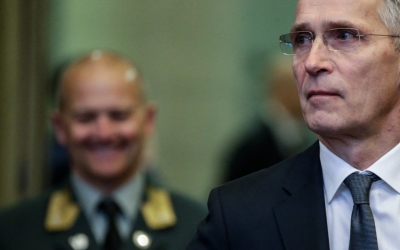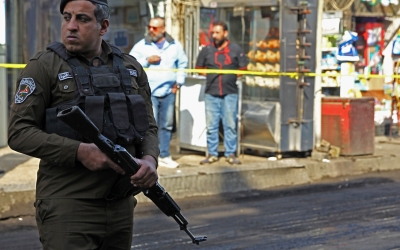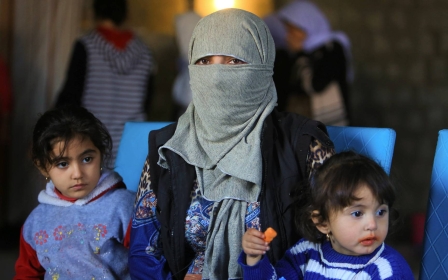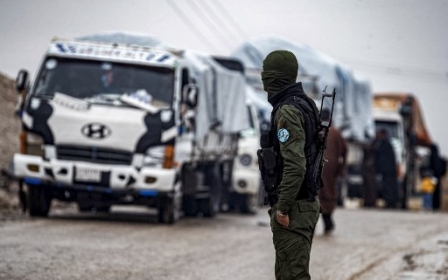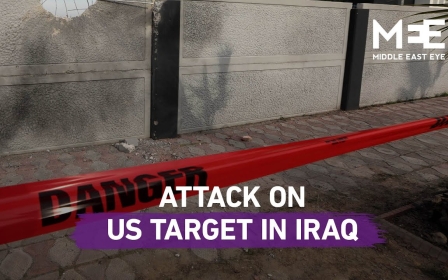Iraq: Rockets target airbase near Baghdad after clashes with IS
Four rockets hit the Al-Balad airbase north of the Iraqi capital on Saturday, the military said, as security sources told AFP a local contractor for a US company managing Iraq's F-16s had been wounded.
The attack came hours after Iraqi security forces raided an Islamic State (IS) hideout in the plains of Tarmiyah, with clashes leaving five jihadists and two pro-government fighters dead, according to the Iraqi military.
F-16s at the Al-Balad airbase were backing the ongoing Tarmiyah operation against IS sleeper cells at the time of the rocket attack, two security sources told AFP.
Al-Balad is around 60km north of Tarmiyah.
The security sources said the US defence company Sallyport had its headquarters within the airbase, and had 46 personnel contracted to provide base services to support Iraq’s F-16 programme.
New MEE newsletter: Jerusalem Dispatch
Sign up to get the latest insights and analysis on Israel-Palestine, alongside Turkey Unpacked and other MEE newsletters
A little-known Shia militant group, Saraya Awliya al-Dam, Arabic for Guardians of Blood Brigade, claimed responsibility for the attack.
A local army source said that Katyusha-style rockets had been fired at the airbase.
One of the rockets hit a part of the base hosting employees of Sallyport, the security sources said.
"An Iraqi contractor sustained moderate injuries," one of the sources said.
Another rocket hit a runway, without disrupting the take-off and landing of aircraft, while a third hit nearby woodlands, the source said.
Coalition crackdown
Iraqi army units at Al-Balad responded to the rockets by firing artillery at a position 12km east of the airbase where they believed the attack originated, the source added.
It is rare for Iraqi security forces to respond so quickly to such an incident.
Dozens of rocket attacks and roadside bombs targeted western military and diplomatic installations last year. US and Iraqi officials have blamed the attacks on armed factions with close ties to Iran - not IS.
Iraqi authorities have struggled to hold the perpetrators of rocket attacks to account, as some of the groups accused are integrated into the state security forces and wield significant influence.
The rocket attacks continued even as the US-led coalition, which helped Iraq declare defeat against IS in 2017, drew down its forces and consolidated bases.
Al-Balad, one of the bases from which the coalition withdrew, once held a small US Air Force contingent but now hosts Iraqi armed forces and the Sallyport contractors.
The US-led coalition has roughly halved its forces over the last year, leaving around 3,500 troops in the country.
They are now based in Baghdad near the US embassy, as well as Ain al-Assad in the country's west and Erbil, the capital of the northern Kurdistan region.
Nato pledges to increase troop numbers
This week, the secretary-general of Nato, Jens Stoltenberg, said that the organisation was preparing to significantly increase troop numbers in Iraq to combat the growing threat from IS.
"We decided to expand Nato's training mission in Iraq to support the Iraqi forces as they fight terrorism and ensure that Isis does not return," Stoltenberg said during a news conference on Thursday, following a meeting of Nato defence ministers.
During the news conference, Stoltenberg stressed that Nato's expanded mission comes "at the request of the Iraqi government" and that "it is carried out with full respect for Iraq’s sovereignty and territorial integrity".
He also noted that training activities would now include more Iraqi security institutions and areas beyond Baghdad.
Nato has had a non-combat, "train-and-advise" mission in Iraq since October 2018. Plans to expand the programme have been in the works for some time but were delayed in part because of the Covid-19 pandemic and also due to security concerns after the US killed top Iranian commander Qassem Soleimani in January 2020, enflaming regional tensions.
Currently, Nato forces only work with members of the Iraqi security institutions and forces who are under the direct control of the Iraqi government.
The expanded mission will likely take over some of the training activities carried out by the US-led coalition against IS, diplomats with knowledge of the situation told the Reuters news agency earlier this week.
The diplomats said the allied mission, involving allies including Britain, Turkey and Denmark and led by a Danish commander, is seen as more acceptable to Iraqis than a US training force.
Anti-IS operations ramped up
The US-led coalition still provides surveillance support and air strikes to help Iraqi forces chase down IS sleeper cells in desert or mountainous areas.
Its Erbil base was targeted on Monday night in a volley of rockets that killed one foreign contractor and wounded several others, as well as a US soldier.
Saturday's violence comes nearly one month to the day after twin suicide bombers killed more than 30 people in the packed Tayaran Square, the bloodiest such attack in Baghdad in three years.
Security sources said the two jihadists had infiltrated the city from the north.
A few days later, nearly a dozen fighters from Iraq's Hashed al-Shaabi, a powerful network of state-sponsored groups, were killed in an IS ambush - also north of the capital.
Since then, security forces have ramped up their efforts to hunt IS sleeper cells there, with Prime Minister Mustafa al-Kadhimi announcing the killing of Abu Yasser al-Issawi, identified as the top IS figure in Iraq, on 28 January.
In early February, security forces killed another IS leader who they believed helped transport the twin bombers into Baghdad.
Iraq declared IS territorially defeated in late 2017 after a three-year fight aided by US-led coalition air strikes and military advisers.
Middle East Eye delivers independent and unrivalled coverage and analysis of the Middle East, North Africa and beyond. To learn more about republishing this content and the associated fees, please fill out this form. More about MEE can be found here.


